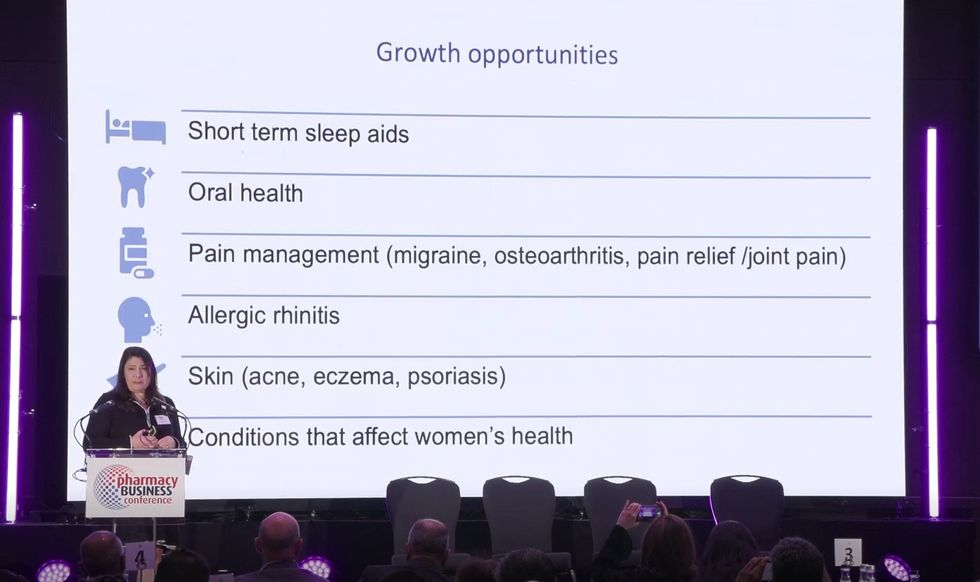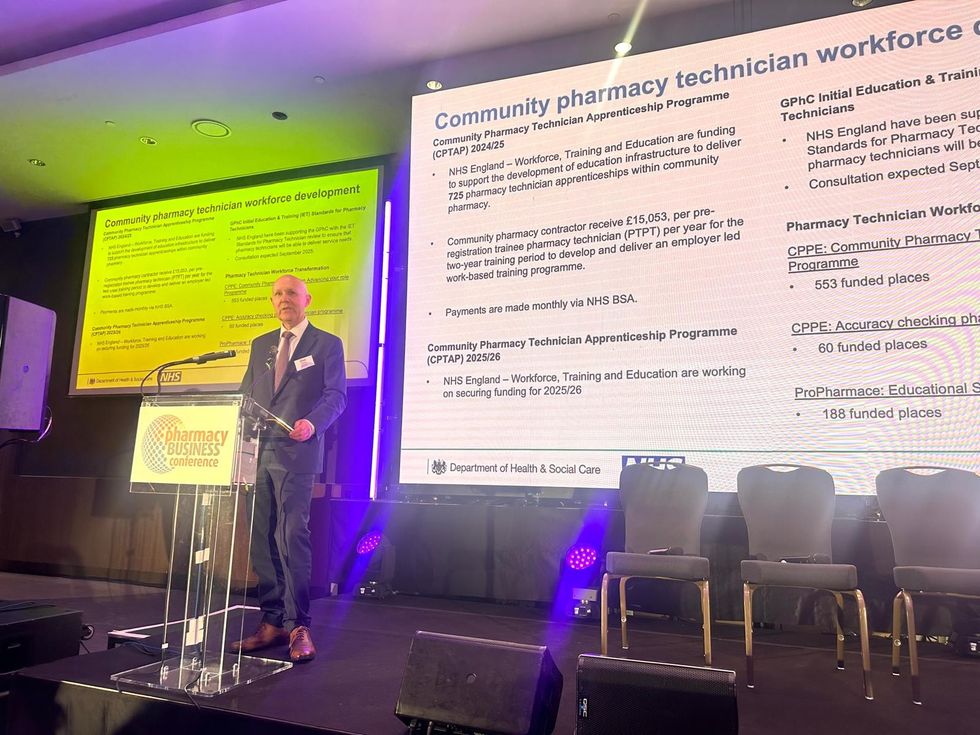Pharmacies have the potential to play a pivotal role in the government's transition from treatment-based healthcare to a more prevention-focused approach. However, for this shift to be successful, they require greater systemic support.
Bas Vorsteveld, Kenvue’s area managing director for Northern Europe, emphasises the importance of allowing pharmacists access to patient records to enable them to offer tailored advice and improve patient care.
“Through targeted initiatives and partnerships within existing frameworks such as Pharmacy First, pharmacists can play an even greater role in supporting individuals to manage minor health concerns independently,” he told Pharmacy Business.
“This extends beyond simply dispensing medications – providing invaluable and accessible medical advice.”
Bas acknowledges the increasing strain UK pharmacists face, including growing workloads and the demands of expanding clinical roles.
“As their role continues to expand, allowing access to patient records, through the existing NHS app, for example, would enable more personalised advice and proactive care,” he said.
“They could help consumers manage common conditions more effectively, reducing the need for GP appointments and relieving pressure on services.”
Bas noted that Kenvue is committed to supporting this transformation through initiatives such as the Pharmacist Leaders Forum, which brings together key stakeholders and industry leaders to explore ways to better support and leverage pharmacists' expertise to enhance patient outcomes.
Pharmacies’ role in preventative care
While pharmacy teams are commonly consulted for concerns like coughs and digestive health issues, Bas highlighted that there's an opportunity to build on personalised discussions around preventative care, like smoking cessation and wider wellness strategies.
“Kenvue is well placed to support these preventative efforts,” he said.
“For example, through NICORETTE®, which has pioneered nicotine replacement therapy innovation and quitter support for over 40 years. The brand is still innovating with NICORETTE® QuickMist, which was the first licensed vaping cessation therapy in the UK to help people achieve a total quit from tobacco and nicotine.”
Although pharmacists are confident addressing a wide range of health issues, a recent survey by the company found they can still feel “uncertain” in specific areas, including oral health and skin concerns.
Bas stressed that targeted training could enhance existing self-care resources and reaffirmed Kenvue’s commitment to empowering pharmacy teams through various support initiatives.
The company is set to launch Kenvue Professionals – an online hub providing educational resources for UK healthcare professionals (HCPs), including pharmacy teams, to support their expanding clinical roles – later this year.
“Our aim is to offer easy-to-access evidence-based information on common conditions and ailments while keeping HCPs updated on our latest brand developments,” he explained.
“We are in discussion with pharmacists to ensure the portal provides the most helpful resources, support and recognition they need to enhance their ability to deliver self-care and other preventative solutions.”
Worryingly, the Kenvue survey revealed that 97% of pharmacists are helping to fill gaps in GP services, yet 63% report struggling with unsustainable workloads, highlighting the need for better support.
“The public’s understanding of a pharmacy team’s role needs to evolve, recognising their expanding role in community care and prevention, and for this to succeed,” Bas noted.
Self-care: A key pillar of preventative healthcare
Self-care is a fundamental component of the shift from treatment to prevention, according to Bas.
“We need to break the habit of reactive care,” he said, noting that self-care is “one of the most promising and exciting approaches” to improve the health and wellbeing of the nation.
He strongly supports integrating self-care into the government’s 10-year health plan, recognising it as a foundation for improved outcomes and a more sustainable healthcare system.
“Ensuring the success of the recent reforms announced by the government - to recentralise the responsibilities of NHS England within the Department for Health and Social Care - will be critical.
“If done right, these reforms have the potential to accelerate the shift from treatment to prevention that the government is aiming for, and self-care can play a huge part in that.”
Bas also welcomed the government’s Tobacco and Vapes Bill, calling for its swift passage to protect future generations from tobacco-related harms.
“Smoking remains the leading cause of preventable death and disease, and we believe it is critical that smokers receive the support they need to quit,” he said.
“The government should now also focus on ensuring that smokers have access to a broad range of therapeutic medicines, such as Nicotine Replacement Therapies, alongside evidence-based services to support their quit journey.”
Oral health is expected to be one of the preventative measures emphasised in the plan.
Bas highlighted that poor oral hygiene, particularly periodontal disease, can be associated with chronic conditions such as heart disease and diabetes.
“As people take a more proactive role in their wellbeing, incorporating a complete oral care routine becomes essential,” he said.
“More comprehensive government policies and recommendations encouraging complete oral health routines can have lasting, impactful results.”
Pharmacies as frontline educators of self-care
Empowering individuals to practise everyday moments of self-care remains a largely untapped healthcare resource, according to Bas.
Additionally, barriers such as limited awareness, access to products and lack of trust persist.
“People often hesitate to take control of their health because they’re overwhelmed by conflicting information,” he explained.
“As an industry, we must collaborate with HCPs to improve health literacy so people understand how self-care can help them take charge of their health.”
Pharmacies, he added, are ideally positioned to become the “frontline educators of self-care”, providing trusted advice on managing common conditions.
“For example, many people think they need antibiotics for colds, coughs, or RSV, driving up antibiotic resistance, even though these upper respiratory conditions are often viral, not bacterial, meaning antibiotics are ineffective.
“In these situations, self-care products and OTC medicines, such as SUDAFED®, BENYLIN® and other products like ZARBEES® can offer effective symptomatic control while the body’s own immune system eliminates the virus.”
The Kenvue survey found that 87% of pharmacists believe better self-care practices could prevent many health issues, with 80% stating that improved consumer education would make a significant impact.
Bas urged the government to develop “a national health literacy blueprint” and build partnerships with key stakeholders, including the private sector, to promote this.
The role of technology in promoting self-care
Looking ahead, digital health tools will play an increasingly vital role in empowering individuals to manage their health before issues arise—a focus likely to be included in the government’s 10-year plan.
“AI is an addition, not a replacement,” Bas clarified.
“In light of the significant amount of care that will be required to manage the aging population in the next 10 to 15 years, it’s been recognised that there is an important role for digital technologies in helping people to be more involved in the self-management of their health.”
Kenvue is already integrating digital solutions in its offerings to empower people to make informed health choices and manage their conditions more efficiently.
For example, their IMODIUM® Gut2Know™ app helps diarrhoea sufferers track their gut health and identify symptom triggers, and the NICORETTE® Stop Smoke & Vape app allows consumers to create a tailored quit plan and track progress.
“It’s about providing encouragement and advice at the right moments to keep people motivated - personalised, digital experiences that integrate naturally into their lives,” he added.
With the right support—through policy changes, public education, and digital innovation—pharmacy teams can become leading providers of self-care and preventative health solutions.










 Patricia Tigenoah-Ojo
Patricia Tigenoah-Ojo Baba Akomolafe,
Baba Akomolafe,  Rachna Chhatralia
Rachna Chhatralia Raj Matharu
Raj Matharu


![Potential Side Effects of Mounjaro [What You Need to Know]](https://www.pharmacy.biz/media-library/image.jpg?id=54516976&width=1245&height=700&quality=90&coordinates=0%2C29%2C0%2C29)



 NielsenIQ data shows a positive trend in OTC sales
NielsenIQ data shows a positive trend in OTC sales  Six broad health conditions where medicines can be reclassified are shown on the screen.
Six broad health conditions where medicines can be reclassified are shown on the screen. 


 Health Secretary Wes Streeting addresses Pharmacy Conference via video
Health Secretary Wes Streeting addresses Pharmacy Conference via video  David Webb, chief pharmaceutical officer of NHS England
David Webb, chief pharmaceutical officer of NHS England Shailesh Solanki, executive editor of Pharmacy Business
Shailesh Solanki, executive editor of Pharmacy Business L-R: Yasmin Karsan, Pritee Panchmatia and Fin McCaul
L-R: Yasmin Karsan, Pritee Panchmatia and Fin McCaul  L-R: Baba Akomolafe, Rachna Chhatralia, Patricia Tigenoah-Ojo and Raj Matharu
L-R: Baba Akomolafe, Rachna Chhatralia, Patricia Tigenoah-Ojo and Raj Matharu L- R: Nicola Stockmann, Robert Townsend, Atul Patel and Amerjit Singh
L- R: Nicola Stockmann, Robert Townsend, Atul Patel and Amerjit Singh Wole Ososami, lead pharmacist at Westbury Chemist
Wole Ososami, lead pharmacist at Westbury Chemist